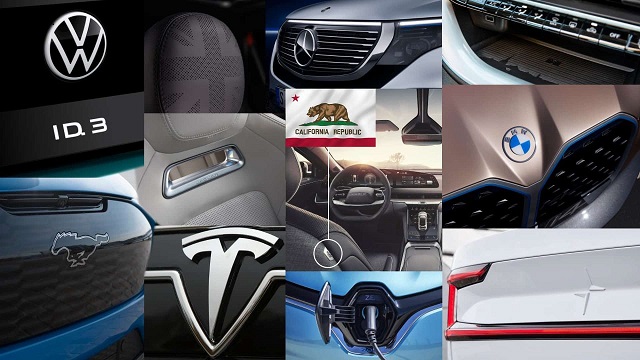Automotive
Automobiles, human nature, and the challenge of building cars that people actually want

From the Frontier Centre for Public Policy
By Terry Etam
Some people out there have an inner itch to do things different. Maybe it’s art, or music, or some other glorious pastime that we as the rest of humanity benefit from, far, far more than we pay. What sort of car these types drive is fascinating; usually something quirky or wonderfully weird; Neil Young spent years before he made it big driving an old hearse, various narcotics taped under the dash.
Others think completely differently, bone-dry aesthetically-speaking; thinkers who just want to make things better. Their inner guiding light is efficiency. I had a genius uncle, a farm boy who made it to high levels in national security in Ottawa through no formal education and sheer ingenuity, who would love describing how he could achieve 70 miles per gallon driving carefully and methodically and under-the-speed-limit around Ottawa in a tiny car, joyously oblivious to Type A heads exploding in his rear-view mirror.
Most people are somewhere in the middle, neither artists nor efficiency maniacs, a space that is quite comfortable for most of humanity. We like nice things, we like how they look, but we also care about practicality. We want to be different from everyone else! But just a bit, or that’s weird. And we all want to drive! Even if it is getting harder and harder for today’s youth to afford it, that drive is still there if finances allow.
This overwhelmingly dominant trait can drive the two extreme camps crazy, a battle that becomes stark and vivid in the automotive industry. Our automotive choices make a statement whether it is intentional or not, and whether we want it or not, because nothing makes a person easier to judge than their automotive preferences.
That’s a reality that people who want to change the world have to accept. It is a very hard thing to swallow, particularly for logicians who can make a near-perfect argument as to why one choice is clearly superior to another, and yet people will look you in the eye and do the opposite. (Long ago when minivans were fully earning their stripes as useful and comfortable transport, about when the perplexing stigma of minivan ownership was setting in, I watched a friend of a friend, standing five-foot-not-much, try and wrestle a mountain bike onto the roof rack of her SUV (yes, yes, I helped), and as she did so she said, “What I really need is a minivan but what would people think of me if I drove one?”)
Minivan vs. SUV was symbolic of the sheer power of how the 80-percent-in-the-middle will shape the landscape, to the extent that personal choice is allowed (hope you’re not scoffing at that, if so, see: federal 2035 all-EV mandate). Because I’m petty and juvenile, it used to fill me with scorn to see people sub-optimize such an expensive purchase on the altar of ‘what other people think of me’.
I’m still petty and juvenile, but have gained enough miles under my wheels to know that things aren’t so simple, and even if they are, it is hardly any of my business what people choose or why. Some care about resale value. Some like an available colour. Some like the feel of the steering wheel or comfort of the seats or the look of the front grille. So what.
It’s not easy for automakers either, because it’s not just that people will actually make auto purchase decisions based on some ridiculously small feature, but also that the lead time from when consumer preferences head in a new direction can be far less than the time it takes to develop a new vehicle. For example, a significant change in gas prices can lead to a preference, or abhorrence, for small, fuel efficient cars, while manufacturers won’t really be able to fully reflect this for a few years.
That’s what makes the EV ‘transition’ so fascinating. If there is one thing that is glaringly obvious in the whole topic, it is that people absolutely do not purchase ‘what they are supposed to’. You can’t make any sense out of it, because the whims and motivations come from external influences that are unpredictable. If Taylor Swift started driving a black Toyota Corolla sedan all of a sudden, what do you think would happen to black Toyota Corolla sedan sales? Not sales of grey ones though, pah! What am I, crazy? Who’d be caught dead in one of those things?
So now, particularly here in Canada but in many other jurisdictions including California, drivers are being told they will not be allowed to buy any new vehicle that isn’t EV, nor will manufacturers be allowed to sell anything that isn’t an EV.
The manufacturers are playing their part, nervously unveiling EV after EV after EV. They advertise the crap out of them, auto publications dutifully test and review them, and the media breathlessly reports how a model’s sales skyrocket by, say 33 percent, when sales go from 3 to 4 units per month.
The media also jumped all over stories about huge demand backlogs, how some new model about to enter showrooms has thousands and thousands of orders or deposits. In 2021, news widely circulated that “Ford F-150 Lightning pre-orders have been closed after nearly 200k reservations”, or Motor Trend’s “Ford Takes in More Than 44,500 F-150 Lightning Orders in 48 Hours”.
Think about how amazing that order book is. A mass manufacturer like Ford is so swamped with interest that they simply must grandiosely and loudly announce: “Sorry Sir or Madam, we can no longer take your order, our success is just too overwhelming.” Many manufacturers reported similar order-book hysteria.
It turns out that the story was surreal, but not quite as it sounds. Through all of 2022, Ford sold only 15,617 electric pickups. The headlines for 2022 results remain starry eyed and insipid: “Ford Tripled BEV Sales In December, Doubled In 2022”, although that couldn’t hold a candle to the infantile enthrallment saved for late 2023: “Ford F-150 Lightning breaks monthly sales record, doubling in November”.
Sales in November 2023 did indeed ‘double’ compared to the prior November, but in the entire quarter Ford sold only 11,905 units. In the two years after the hail-the-future order book bumper crop, Ford only sold about 40,000 F-150 Lightnings. In two years. Recently Ford announced a halving of 2024 production plans down to about 1,600 units per week, or just under 7,000 per month.
Keep in mind that in 2023 Ford sold over 750,000 F-150 internal combustion pickups in the US, and many of these go to urban dwellers for whom an EV pickup might make total sense – ones that rarely leave the city (EVs are in general far better suited to urban environments where they can scoot home safely to a nice warm private charging station every night).
Which brings us back to consumer behaviour again, that mystifying and surely exasperating trait of humanity that no amount of cajoling and ‘proper thinking’ will break. “Two hundred thousand reservations!” to “Slashing production forecasts!” In half. On a variant of the most popular vehicle in the US.
Tesla continues to dominate EV sales, and many people, when they decide they want an EV, mean they want a Tesla (in the pickup world, Rivian might be the Tesla of EV pickups, time will tell). Major auto manufacturers are having a very difficult time seeing EV sales grow to any level that would approach profitability.
It’s hard not to feel bad for them, if one can or should feel bad for huge corporations. How on earth does one plan for the coming year, when two hundred thousand consumers say yes, I want one of those, but then 80 percent change their mind by the time Ford can actually manufacture them?
But observe; whispering in their manufacturing ears are governments saying not subtly that “Don’t worry, we will be legislating internal combustion out of existence, just build them and they will come…” Said less loudly is the supporting evidence: “because they have no choice.” Well, it worked for a while in the Soviet Union didn’t it?
Making things even more complicated for manufacturers are upcoming elections in the US (this year) and Canada (what feels like an eternity but is really only 1.5 years) that could see either minor or major revisions to EV policy rollouts of the past few years.
But forget all the uncertainty surrounding manufacturers; that all gets trumped (no pun intended) by the human element. Here’s an important realization that we all need to accept: Some stuff just gives us a sense of belonging with others in a way that is critical to mental well being. Some people like to dress in the latest fashion. Some get the most popular hair styling. Some drive a rugged SUV because of what it says about them.
That can make manufacturers pull their hair out, because something illogical might be their biggest hit ever. But on top of that one must now layer the rancid decay of politics. EV sales seem to be falling along political fault lines, which in a way is not surprising: one side of the political spectrum sees climate change as a moral imperative to be dealt with as rapidly as possible, and that element, to the extent it can afford it, is responsible for the highest uptake of EVs (it is another sign that ‘left wing vs. right wing’ is a historical anachronism of little value any more; the traditional ‘left’ represented the working class, the downtrodden, the ones that needed a safety net; today’s main EV purchasers are wealthy enough to pursue Teslas first and foremost, often with a multi-car garage full of options). EV as political statement is yet another example of how our preferences link us to a tribe of our choice, rational or not, and it will be supra-humanly difficult to change that, whether in Canada or the US or Togo.
All one can conclude from this hodgepodge of observations is that the auto market will continue to reflect certain aspects of human nature that we may not even be aware of ourselves, and also reflect physical, financial and security realities/rationales that will not be changed by government edict. I have no idea what that means in terms of a transition to EVs, and that trajectory could change with the development of new battery technology, for example. But at present, it should be clear, based on examples like the Ford F-150 Lightning EV experience, that human enthusiasm and professed care does not necessarily translate well into the cold hard reality of what people put their money down on.
It is a nuanced world. People are imperfect and beautifully so, it adds colour to the world. Either the landscape is more or less free, where people express themselves as they wish, or it is a closed quasi- or full-dictatorship where that is not permitted (see: censorship, over-reaching legislation, thought police/moralistic systemic governmental intervention, personal carbon budgets, etc.). The latter never succeeds because it fights human nature, and the former has elements that make no sense outside one’s own circle of people that get it. I choose not to be part of some tribes, but I probably choose to be part of others, and likely do so subconsciously, which makes the whole thing even trickier.
Current politicians and WEF-types believe they have a blueprint for humanity to unroll. It is an absurdity, if for no other reason than they can’t comprehend the complex realities of 8 billion people whom they are trying to force in a certain direction. They are trying to force them all into metaphorical minivans, because minivans make more sense than anything else. They will fail.
Terry Etam is a columnist with the BOE Report, a leading energy industry newsletter based in Calgary. He is the author of The End of Fossil Fuel Insanity. You can watch his Policy on the Frontier session from May 5, 2022 here.
Automotive
Big Auto Wants Your Data. Trump and Congress Aren’t Having It.


From the Daily Caller News Foundation
Congress is not going to allow Big Auto to sideline consumer privacy and safety while getting subsidized massively by the federal government.
That is because, in late September, by an overwhelming vote of 50 to 1, Chairman Brett Guthrie’s (R-KY) House Energy & Commerce Committee joined the Senate Commerce, Science, and Transportation Committee in passing the AM Radio for Every Vehicle Act.
This legislation is in response to some automakers removing AM radios from new model vehicles despite pleas from America’s public safety community not to do so.
Dear Readers:
As a nonprofit, we are dependent on the generosity of our readers.
Please consider making a small donation of any amount here.
Thank you!
“They’d rather force consumers to use their infotainment devices — which collect and sell their third-party data — than protect American lives,” Corey Lewandowski, President Trump’s 2016 campaign manager and senior adviser to his 2020 and 2024 campaigns, stated.
The entirety of America’s public safety community spanning the federal, state, and local levels, insists AM radio remaining in cars is critical for protecting the nation’s emergency alerting systems. These systems rely heavily upon AM radio, the only communication method that has stayed reliably accessible during many disasters such as the Sept.11 terrorist attack and major disasters like Hurricanes Katrina, Sandy, and most recently, Helene.
Brendan Carr, the current chairman of President Trump’s FCC, nominated by President Trump, has also endorsed the AM Radio for Every Vehicle Act. In a statement, Carr said that “millions of Americans depend on the value of AM radio and the local news that AM broadcasters offer in communities across the country.” He also recounted hearing firsthand stories of Hurricane Helene victims who “could only access lifesaving information in the days following the storm by tuning into their AM radios.”
AM radio also serves another purpose that the elites in Silicon Valley and Detroit often forget: it keeps rural and working-class America connected. Millions of people outside the big cities rely on AM for local news, farm reports, weather alerts, and even community events. For many small towns, AM stations are a lifeline—far more reliable than expensive streaming services or spotty cell coverage. Pulling it out of cars is yet another way of telling Middle America: “you don’t matter.”
Of course, no good idea in Washington is safe from special interests.
Despite the broad support within Congress, the administration, and throughout the public safety and first responder communities, the bill has faced a full-court press by the musicFIRST Coalition — a group backed by the Recording Industry of America — to tank the legislation unless it is tied to unrelated music royalty reform legislation. That’s cronyism politics at its worst—holding public safety hostage to squeeze out another payday.
However, now that the AM Radio for Every Vehicle Act has passed both committees by overwhelming margins, the only stop left for the legislation is the House and Senate Floor — meaning Speaker Mike Johnson (R-LA) and House Majority Leader John Thune (R-SD) must call it up for a roll call vote.
At the heart of this fight is more than just whether a radio dial stays in your dashboard. It’s about whether Americans can trust that their safety won’t be sacrificed for corporate profit.
It’s also about data privacy. Automakers and Big Tech are eager to funnel drivers into infotainment systems that monitor every move, harvest personal information, and sell it to the highest bidder. AM radio doesn’t spy on you. It doesn’t crash when the grid goes down. It doesn’t put profit ahead of people. It just works.
For the sake of both public safety and personal freedom, Congress should make sure it stays that way.
Ken Blackwell (@KenBlackwell) is an adviser to the Family Research Council and a chair at the America First Policy Institute. He is a former Mayor of Cincinnati, Ohio, Ohio Treasurer and Secretary of State, and U.S. Ambassador to the United Nations Human Rights Commission. He is also a former member of the Trump transition team.
Automotive
Governments continue to support irrational ‘electric vehicle’ policies

From the Fraser Institute
Another day, another electric vehicle (EV) fantasy failure. The Quebec government is “pulling the plug” on its relationship with the Northvolt EV battery company (which is now bankrupt), and will try to recoup some of its $270 million loss on the project. Quebec’s “investment” was in support of a planned $7 billion “megaproject” battery manufacturing facility on Montreal’s South Shore. (As an aside, what normal people would call gambling with taxpayer money, governments call “investments.” But that’s another story.)
Anyway, for those who have not followed this latest EV-burn out, back in September 2023, the Legault government announced plans to “invest” $510 million in the project, which was to be located in Saint-Basile-le-Grand and McMasterville. The government subsequently granted Northvolt a $240 million loan guarantee to buy the land for the plant, then injected another $270 million directly into Northvolt. According to the Financial Post, “Quebec has lost $270 million on its equity investment… but still had a senior secured loan tied to the land acquired to build the plant, which totals nearly $260 million with interest and fees.” In other words, Quebec taxpayers lost big.
But Northvolt is just the latest in a litany of failure by Canadian governments and their dreams of an EV future free of dreaded fossil fuels. I know, politicians say that it’s a battle against climate change, but that’s silly. Canada is such a small emitter of greenhouse gases that nothing it could do, including shutting down the entire national economy, would significantly alter the trajectory of the climate. Anything Canada might achieve would be cancelled out by economic growth in China in a matter of weeks.
So back to the litany of failed or failing EV-dream projects. To date (from about 2020) it goes like this: Ford (2024), Umicore battery (2024), Honda (2025),General Motors CAMI (2025), Lion Electric (2025), Northvolt (2025). And this does not count projects still limping along after major setbacks such as Stellantis and Volkswagen.
One has to wonder how many tombstones of dead EV fantasy projects will be needed before Canada’s climate-obsessed governments get a clue: people are not playing. Car buyers are not snapping up these vehicles as government predicted; the technologies and manufacturing ability are not showing up as government predicted; declining cost curves are not showing up as government predicted; taxpayer-subsidized projects keep dying; the U.S. market for Canada’s EV tech that government predicted has been Trumped out of existence (e.g. the Trump administration has scrapped EV mandates and federal subsidies for EV purchases); and government is taking the money for all these failed predictions from Canadian workers who can’t afford EVs. It really is a policy travesty.
And yet, like a bad dream, Canada’s governments (including the Carney government) are still backing an irrational policy to force EVs into the marketplace. For example, Ottawa stills mandates that all new light-duty vehicle sales be EVs by 2035. This despite Canadian automakers earnest pleas for the government to scrap the mandate.
Canada’s EV policy is quickly coming to resemble something out of dysfunctional-heroic fiction. We are the Don Quixotes, tilting futilely at EV windmills, and Captain Ahabs, trying to slay the dreaded white whale of fossil-fuelled transportation with our EV harpoons. Really, isn’t it time governments took a look at reality and cut their losses? Canada’s taxpayers would surely appreciate the break.
-

 Red Deer2 days ago
Red Deer2 days agoThe City of Red Deer’s Financial Troubles: Here Are The Candidates I Am Voting For And Why.
-

 Business2 days ago
Business2 days agoCanada Post is failing Canadians—time to privatize it
-

 Business2 days ago
Business2 days agoYour $350 Grocery Question: Gouging or Economics?
-

 2025 Federal Election12 hours ago
2025 Federal Election12 hours agoProtestor Behind ‘Longest Ballot’ Chaos targeting Poilievre pontificates to Commons Committee
-

 Media2 days ago
Media2 days agoResponse to any budget sleight of hand will determine which audience media have decided to serve
-

 Education2 days ago
Education2 days agoClassroom Size Isn’t The Real Issue
-

 illegal immigration2 days ago
illegal immigration2 days ago$4.5B awarded in new contracts to build Smart Wall along southwest border
-

 Frontier Centre for Public Policy2 days ago
Frontier Centre for Public Policy2 days agoCanada’s Democracy Is Running On Fumes








